Bitwarden vs 1Password — The Ultimate Comparison (2025)
If you’re finding it hard to choose between Bitwarden and 1Password, you’re not alone. Both of them are secure options with a variety of good features. 1Password’s lack of a free version could make Bitwarden’s strong free plan seem appealing, but how do both password managers compare when put side-by-side?
To find out, I tested both Bitwarden and 1Password across 15 different areas to find out which is best for organizing all your logins. I considered the security features, core password management features, device compatibility, ease of use, and value for money.
After my tests, 1Password emerged as the undisputed winner, and for many good reasons. It has a better range of features, easily integrates with multiple devices, and is very intuitive. Plus, you can try 1Password risk-free using the 14-day free trial to be sure it’s right for you.
Organize your logins with 1Password
No Time? Here’s a 1-Minute Summary of Category Winners
Bitwarden and 1Password and top password managers on the market, but after testing them both, I found that 1Password offers more features and is much easier to use.
 |
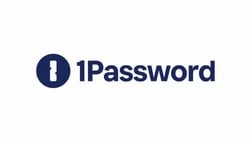 |
|
| Encryption | Uses AES 256-bit encryption to protect your data | Employs AES 256-bit encryption alongside a Secret Key |
| Two-factor Authentication (2FA) | Supports TOTP and hardware security keys | Offers TOTP and hardware authentication options |
| Password Storage | Unlimited password storage, plus 1GB of storage for files | Unlimited password storage, plus 1GB for files, and supports more item categories |
| Auto-Save and Fill | Lets you auto-fill and save information, but it is a bit clunky | Auto-fills and saves information on websites conveniently |
| Password Generator | Generates secure passwords and passphrases | Creates passwords, passphrases, and PINs to protect your accounts |
| Privacy | Adopts an open-source approach and has undergone independent security audits | Uses a proprietary model, but has also undergone several security audits |
| Password Auditing | Analyzes the strength and security of your passwords | Keeps a check on your password health and provides a more detailed report |
| Password Sharing | Bitwarden allows you to share passwords with multiple users, but not an entire vault | 1Password lets you share passwords with unlimited users and an entire vault |
| Ease of Use | Easy to use, but the interface is a bit dated in design | Very user-friendly and has intuitive interfaces across its apps |
| Extra Features | Provides only 2 extra features | Offers more extra features compared to Bitwarden |
| Device Compatibility | Works with Windows, macOS, Linux, Android, and iOS devices | Supports Windows, Linux, Mac, iOS, and Android devices |
| Customer Service | Offers email, online knowledgebase, and community forums | Provides fast email support, rich online knowledgebase, and a very interactive community forum |
| Price | Priced affordably and costs a few cents monthly | Provides good value but is priced slightly higher |
| Free Version | Has a decent free version that supports unlimited storage | Doesn’t offer a free version |
| Money-Back Guarantee | Offers a 30-day money-back guarantee | Doesn’t have a money-back guarantee |
How I Tested and Compared Bitwarden vs 1Password
To compare Bitwarden vs. 1Password extensively to see if any one of them can match the top password managers on the market. I employed the following criteria to come up with a comprehensive comparison:
- Encryption — I evaluated the encryption methods used by Bitwarden and 1Password to ensure the security of stored passwords.
- Two-Factor Authentication (2FA) — I assessed the availability and effectiveness of Two-Factor Authentication (2FA) options in both Bitwarden and 1Password for added security.
- Password Storage — I compared the password storage capabilities of Bitwarden and 1Password, including the capacity to store and organize passwords.
- Auto-Save and Fill — I tested the auto-save and fill functionality in both Bitwarden and 1Password to evaluate their convenience and efficiency in managing passwords.
- Password Generator — I examined the password generator feature in both applications to assess their ability to create strong and unique passwords.
- Privacy — I considered the privacy policies and data handling practices of Bitwarden and 1Password to ensure user information is kept secure.
- Password Auditing — I checked if both Bitwarden and 1Password offer password auditing tools to help users identify and update weak or compromised passwords.
- Password Sharing — I evaluated the password-sharing features in Bitwarden and 1Password, including the ease of sharing passwords with trusted individuals or teams.
- Ease of Use — I assessed the ease of use of both Bitwarden and 1Password, including the user interface and overall user experience.
- Extra Features — I explored any additional features or functionalities offered by Bitwarden and 1Password beyond basic password management.
- Device Compatibility — I verified the compatibility of Bitwarden and 1Password with various devices and platforms to ensure they meet the user’s needs.
- Customer Service — I tested the responsiveness and helpfulness of the customer service provided by Bitwarden and 1Password.
- Price — I compared the pricing plans of Bitwarden and 1Password to determine their value for money.
- Free Version — I considered the availability and features of free versions if offered by Bitwarden and 1Password.
- Money-Back Guarantee — I checked whether Bitwarden or 1Password provides a money-back guarantee to ensure user satisfaction and risk-free trials.
1. Encryption —Both Password Managers Offer Top-Tier Security, but 1Password Goes a Step Further
Bitwarden and 1Password prioritize encryption as a fundamental element of their services, with both utilizing military-grade AES 256-bit encryption. However, 1Password takes it a step further by providing an additional layer of encryption, making it the winner in this category.
Bitwarden employs end-to-end encryption, meaning your data is encrypted on-device before it reaches its servers. This ensures that Bitwarden cannot access your unencrypted data, enhancing overall security. Additionally, Bitwarden is open-source, allowing the security community to continuously scrutinize and improve its encryption protocols.
On the other hand, 1Password also employs robust encryption techniques. They use industry-standard AES-256 encryption to protect your data at rest and in transit. Furthermore, 1Password offers an additional layer of security through a Secret Key, which is never transmitted or stored on their servers. This enhances the security of your master password.
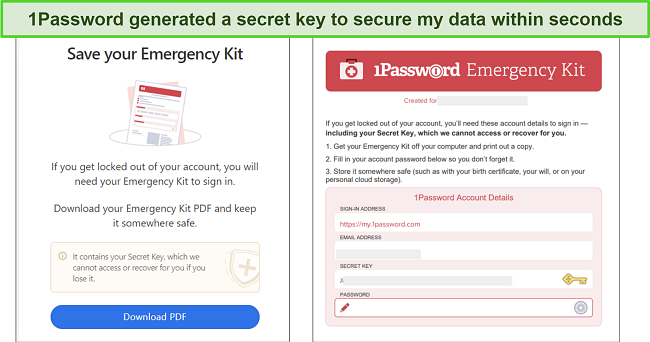
Your Master Password is hashed, and the salt undergoes 100,000 iterations of PBKDF2-HMAC-SHA256. This robust encryption ensures that even hackers equipped with substantial processing power, attempting millions of guesses, won’t be able to decrypt the data in your 1Password vault in the foreseeable future.
While both Bitwarden and 1Password prioritize encryption, 1Password’s robust encryption methods and unique Secret Key add an extra layer of protection that makes it slightly better than Bitdwarden.
Encryption Winner: 1Password
2. Two-Factor Authentication (2FA) — Bitwarden and 1Password Both Offer an Extra Layer of Security
Bitwarden and 1Password both offer multiple two-factor authentication (2FA) options for an additional layer of security. This allows you to further protect the data in your vault, so only you can access it.
Bitwarden seamlessly supports Time-based One-Time Passwords (TOTP), integrating with popular authenticator apps such as Authy and Google Authenticator. Alternatively, you can receive your 2FA codes via email. Premium users also have the option to utilize hardware authenticator devices like Duo, YubiKey, and FIDO U2F for added security.
Similarly, 1Password also provides robust 2FA options, including TOTP, and it works with authenticator apps such as Google Authenticator, Authy, Okta, and Microsoft Authenticator. If you prefer hardware authentication options, you’ll be pleased to learn that 1Password also works with YubiKey, Titan, and Duo Security.
Overall, both Bitwarden and 1Password deliver solid 2FA security options to protect your sensitive data. Hence, this category ends in a draw.
Two-Factor Authentication (2FA) Winner: Tie
3. Password Storage — 1Password Lets You Store More Item Categories
Both password managers provide storage capacity for unlimited credentials, but 1Password offers the option to store more item categories in its encrypted vault. Bitwarden and 1Password both offer 1GB of storage for individual users, but 1Password extends it to 5GB for Business users.
1Password’s vault is a versatile repository capable of securely storing an array of data types. From essential login credentials and passwords to personal notes, medical records, and even sensitive financial information like bank account details and software licenses, it covers a broad spectrum of personal and professional data.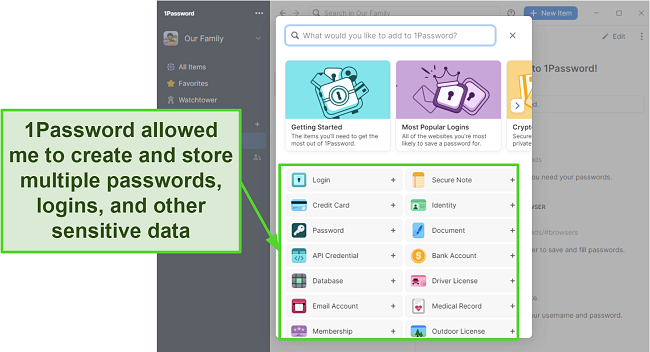
Additionally, it accommodates API credentials, passport details, databases, email credentials, server access information, crypto private keys, and driver’s license records. Adding new items to your vault is a breeze – simply click the “New Item” button located conveniently at the top-right corner of the desktop app.
Unlike 1Password, Bitwarden restricts you to storing only 4 types of data in your vault. Specifically, you can save login passwords, credit card information, identity cards, and notes. Some users may see this as restrictive compared to the broader range of data types that other password managers can store, especially when comparing it to 1Password.
One advantage of Bitwarden is that it allows you to self-host your vault, which makes it limitless. However, if you choose to host on Bitwarden’s servers, you can’t upload files of more than 500MB on a desktop and 100MB from a mobile device.
In summary, Bitwarden and 1Password provide unlimited password storage to keep all your passwords. However, given that 1Password offers more item categories and larger storage options, it wins in this section.
Password Storage Winner: 1Password
4. Auto-Save and Fill — 1Password’s Auto-Fill Function Is More Convenient
Bitwarden and 1Password both offer auto-save and auto-fill features for convenient password management, but I found 1Password’s autofill feature to be less clunky compared to Bitwarden. Therefore, 1Password excels in this category.
1Password offers a convenient auto-save and auto-fill functionality across various web browsers and platforms. It seamlessly captures and populates login credentials, credit card details, and personal information, making sure you don’t lose a sweat when signing in to any site. While testing the feature, I found it worked seamlessly on my browser and mobile device.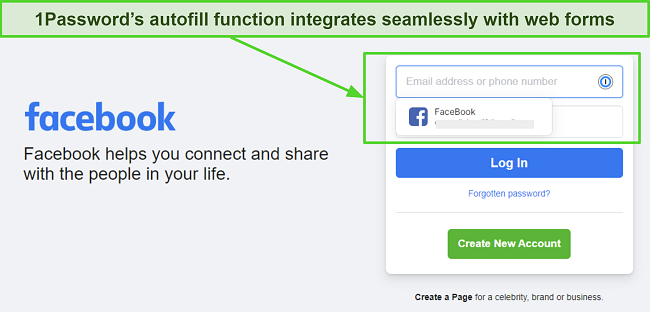
In contrast, Bitwarden’s auto-fill feature didn’t offer the same level of user-friendliness as 1Password’s. Although Bitwarden does provide auto-save and auto-fill capabilities, my experience was less satisfying because it felt outdated and lacked direct integration with website forms.
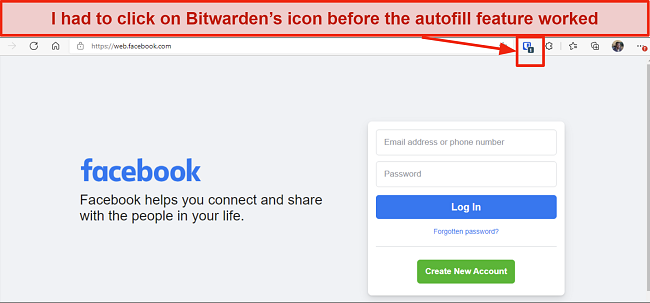
To utilize Bitwarden’s auto-fill feature, I had to manually click on the web browser extension icon first, which added an extra step to the process.
While both Bitwarden and 1Password provide auto-save and auto-fill functions, 1Password’s convenient browser extensions and apps make it much more intuitive to use compared to Bitwarden. Hence, 1Password wins in this category.
Auto-Save and Fill Winner: 1Password
5. Password Generator — 1Password Lets You Generate Secure Passwords
Bitwarden and 1Password both offer valuable tools to create strong and unique passwords, but 1Password provides more options to choose from. A password generator creates strong, random passwords to enhance security by reducing the risk of unauthorized access to accounts and sensitive information.
Bitwarden provides a robust password generator with customizable options. You can set the length (5 to 128 characters), include special characters, and choose whether to capitalize the words or not. Apart from passwords, Bitwarden also allows you to generate passphrases, which are much easier to remember and equally secure.
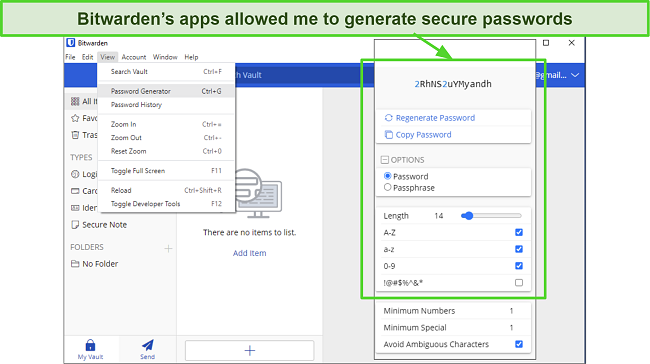
1Password also offers a robust password generator, with customizable options just like Bitwarden’s, but only that it’s better. You can generate secure random passwords, passphrases, or PINs to protect your accounts. You can also adjust the lengths of the passwords (up to 100 characters) and include symbols or numbers.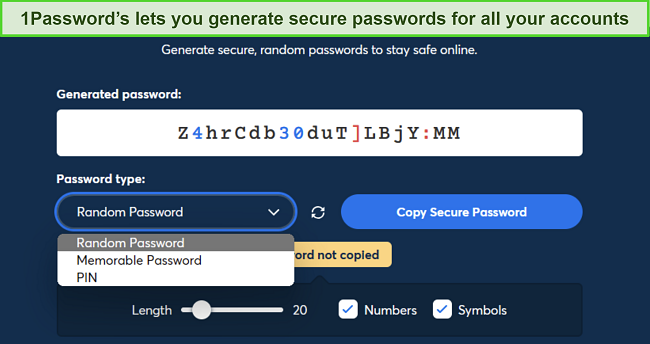
Overall, 1Password’s password generator ability to generate PINs alongside passphrases and passwords puts it at an advantage over Bitwarden, and as such, it wins in this category. Plus, it is also very customizable and adaptable, making it an ideal choice for those who prioritize control over password strength.
Password Generator Winner: 1Password
6. Privacy — Bitwarden Stands Out for Being Open-Source
Privacy is a critical factor when choosing a password manager, and both Bitwarden and 1Password take it seriously. Both password managers have zero-knowledge models, have been independently audited by third parties like Cure53, and are Type 2 certified. However, I found that Bitwarden is the most privacy-friendly option overall.
Bitwarden stands out for its commitment to open-source software, which means the source code is publicly available and can be scrutinized by the community. This transparency enhances trust, as it allows users to ensure that their data is handled securely. Additionally, Bitwarden offers the option for self-hosting, giving users even more control over their data.
1Password, on the other hand, relies on a proprietary model, which means the source code is not publicly accessible. However, it has undergone extensive security audits and is known for its robust encryption practices. 1Password’s security model is trusted by many organizations, including businesses and government agencies.
Both Bitwarden and 1Password adhere to strict privacy policies, ensuring that your data remains confidential. However, Bitwarden’s open-source approach and the various third-party audits place it slightly above 1Password in terms of privacy.
Privacy Winner:
7. Password Auditing — 1Password’s WatchTower Provides Detailed Password Analysis
When it comes to password auditing, Bitwarden and 1Password both offer robust tools to help you identify and improve weak or compromised passwords, but I found 1Password’s options to be much easier to use.
Bitwarden provides a password health report that analyzes the strength and security of your stored passwords. It highlights weak, reused, or compromised passwords, helping users proactively enhance their security. It also integrates with the Have I Been Pwned database to check if your passwords have been part of any data breaches.
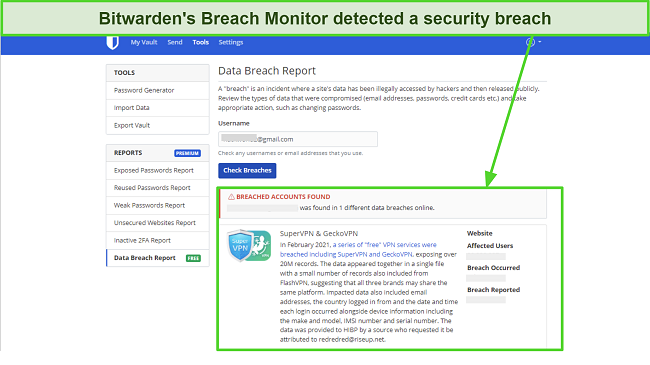
1Password’s security alert system, known as Watchtower, actively monitors your passwords. It provides alerts for issues like weak, reused, or compromised passwords and forthcoming expiration dates for credit cards, driver’s licenses, identity cards, and passports — all while keeping this sensitive data secure on your device.
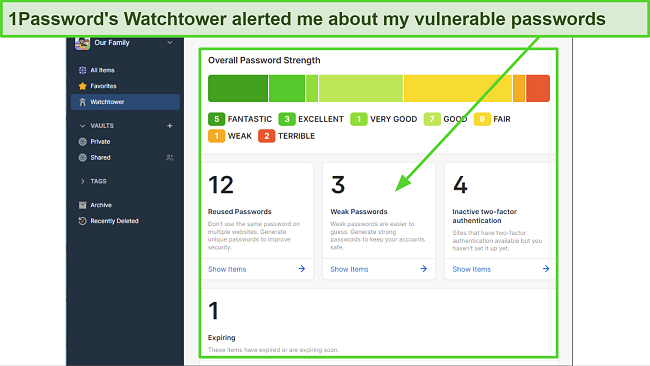
Furthermore, 1Password actively monitors data breaches and notifies you if any of your stored credentials are compromised. It uses the same Have I Been Pwned database, just like Bitwarden, but its reporting is well presented compared to Bitwarden.
While both excel in password auditing, 1Password’s user-friendly presentation and comprehensive monitoring make it a standout choice for those seeking an intuitive experience in managing and securing their passwords. Therefore, 1Password wins in this category.
Password Auditing Winner: 1Password
8. Password Sharing — 1Password Allows You to Share Logins With More People
Password sharing is a crucial feature for individuals and teams who need to share login credentials securely, and both Bitwarden and 1Password offer this functionality, albeit with some distinctions. Overall, 1Password offers better sharing options than Bitwarden.
Bitwarden simplifies the process of sharing sensitive information with its “Send” feature, enabling you to transmit text data like passwords, logins, notes, or files swiftly, just like sending an email. You can also share folders with Bitwarden’s Organization feature, but the tool is a bit complicated for non-tech-savvy users.
What sets Bitwarden’s Send feature apart is its high degree of customization. You can set viewing limits, add a password for access, and set expiry and deletion dates for the shared content. Plus, the recipients don’t need to create a Bitwarden account to access these shares.
However, with the free plan, you can only transmit text data; for file sharing, you’d need to subscribe to Bitwarden Premium. While the Send feature is impressive, it would be even more versatile if it allowed for secure folder sharing, which is where 1Password shines.
1Password has all these customization options that Bitwarden offers but with no limits. For instance, you can share passwords with multiple users at a time and even share a vault if you’re subscribed to the Family, Teams, or Business plans. It also includes fine-grained permission settings, ensuring that users can control who has access to what passwords.
In summary, both Bitwarden and 1Password provide secure solutions for password sharing, but 1Password’s versatility and extensive sharing options, particularly for multiple users and folder sharing, make it the more comprehensive choice.
Password Sharing Winner: 1Password
9. Ease of Use — 1Password Is Very Easy to Use
Both Bitwarden and 1Password strive to provide user-friendly experiences, but I found 1Password to be generally more intuitive and easy to use. The interface is the first experience you’ll have with any app, and that’s the reason it needs to be very appealing.
Bitwarden offers a straightforward and intuitive interface across its web, desktop, and mobile applications, but the interface looks a bit out of style. You can quickly add and organize passwords, access password generators, and navigate settings with ease. However, I noticed that the apps are quite different, with the desktop app being the most feature-rich.
1Password offers a user-friendly application designed for storing, managing, and safeguarding passwords. Its intuitive interface presents all features clearly, ensuring easy navigation. Throughout my experience, I encountered no app crashes or login delays, highlighting its reliability and smooth operation.
1Password’s desktop and mobile apps boast user-friendly and intuitive interfaces, neatly categorizing features into 4 menus: Favorites, Categories, Tags, and Settings. So, you won’t notice much difference irrespective of the device you’re using. The only downside that I noticed is the time it takes to enter your 34-digit Secret Key when adding a new device.
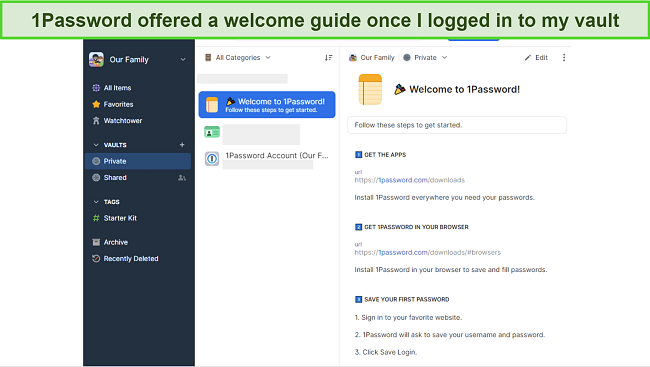
In terms of ease of use, 1Password’s simplicity and user-friendliness make it accessible to a broader audience, making it the winner in this category. However, both password managers are pretty easy to use.
Ease of Use Winner: 1Password
10. Extra Features — 1Password Has More Extra Features
Both Bitwarden and 1Password offer extra features, but 1Password has more. Bitwarden focuses primarily on core password management features. So, you won’t see as many extras as 1Password has.
Bitwarden supports the following features:
- Self-hosting — offers the option for users to host their password data on their servers.
- Secure File Attachments — lets you attach and secure files alongside passwords.
1Password, on the other hand, boasts a wider range of extra features. It includes:
- Travel Mode — safeguards sensitive data when traveling by removing it from devices temporarily.
- Privacy Cards (Virtual cards) — generates temporary credit card numbers for secure and anonymous online purchases.
- Passkeys — allow you to create and manage secure cryptographic keys or passphrases on supported websites for improved security.
Overall, 1Password provides a more comprehensive suite of tools, making it a versatile choice for users seeking additional functionalities beyond basic password management.
Extra Features Winner: 1Password
11. Device Compatibility — Both Password Managers Work With Popular Devices
Bitwarden and 1Password both offer wide device compatibility, ensuring users can access their passwords and secure data across various platforms.
Bitwarden is known for its excellent cross-platform support. It works with the following devices and browsers:
- Windows (10 and 11)
- macOS (10.14 or later)
- Linux (Ubuntu, Debian, Linux Mint, Fedora, CentOS, RHEL, OpenSUSE, etc.)
- iOS (11.0 or later)
- Android (5.0 or later)
- Browser extension (Chrome, Firefox, Edge, Opera, Tor Browser, Vivaldi, Brave, and Safari)
- Command Line (for advanced users on various platforms)
Similarly, 1Password provides robust device compatibility. It covers most major platforms, ensuring users can seamlessly access their passwords regardless of the device they use. The supported platforms are:
- Windows (11 64-bit or Windows 10 64-bit)
- macOS (10.15 or later)
- iOS (15.5 or newer)
- Android (Android 9.0 or later)
- Linux (Ubuntu, Debian, Linux Mint, Fedora, CentOS, RHEL, openSUSE distributions).
- Browser extension (Chrome, Firefox, Safari, and Brave)
- Command Line (for advanced users on various platforms)
In terms of device compatibility, both Bitwarden and 1Password perform admirably, offering widespread support across desktop, mobile, and browser environments. Hence, this round ends in a draw.
Device Compatibility Winner: Tie
12. Customer Service — 1Password’s Community Forum Stands Out
Both Bitwarden and 1Password offer excellent customer support options, primarily via email, community forums, and online knowledgebase. Customer service plays a crucial role in any software or service, and I was impressed with the quality of support offered by both password managers.
I reached out to Bitwarden’s customer support via email to inquire about the security measures concerning its vault in the event of a potential hack. Within 2 hours, I received a comprehensive response containing valuable information that effectively alleviated my concerns. They also have a rich online knowledge base and community forum.
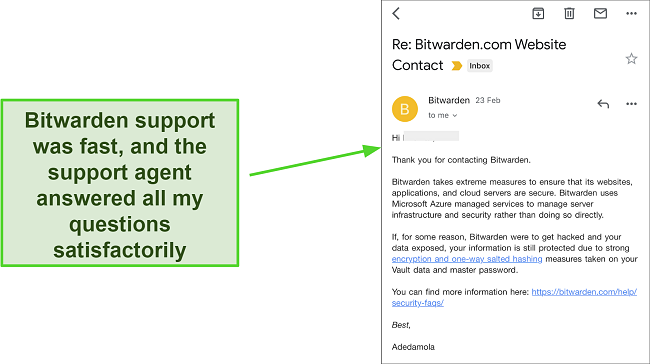
1Password also provides prompt email support. I sent a few inquiries to their support email regarding their anti-keylogging feature, and to my satisfaction, I received a response in under 3 hours. The reply addressed all of my concerns comprehensively and provided guidance to protect against keylogging threats.
Furthermore, you can engage 1Password’s community forum, which boasts an extensive database of over 250,000 questions and receives around 100 or more responses daily. When I posted a question there, I received a response in under 4 hours, showcasing the community’s active engagement. There’s also a Twitter handle with equally prompt and valuable responses.
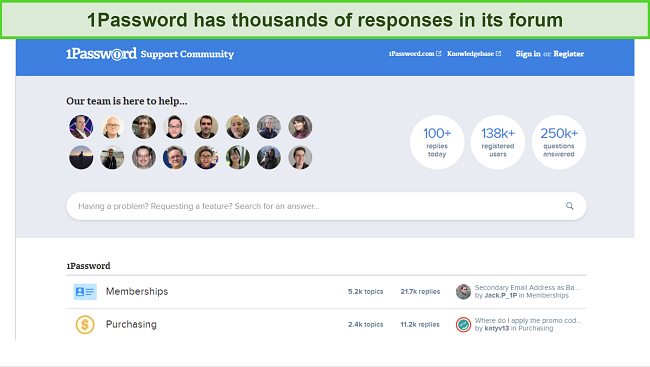
Overall, both Bitwarden and 1Password deliver impressive customer support options, ensuring users can find assistance and answers to their queries effectively. However, given that 1Password offers more support options and a very commendable community forum, it takes the lead in this category.
Customer Service Winner: 1Password
13. Price — Bitwarden Offers Cheaper Plans
In the Bitwarden vs. 1Password price comparison, both password managers offer various pricing tiers to cater to different user needs and budgets. However, Bitwarden has a notable advantage when it comes to affordability.
Bitwarden’s pricing options are as follows:
- Free Version — Bitwarden offers a fully functional free version with essential features like unlimited password storage, password generation, and secure notes.
- Premium Plan — Bitwarden’s premium plan is priced at a very affordable rate. This subscription unlocks additional features like two-factor authentication (2FA) with hardware security keys, secure file storage, and priority customer support.
- Family Plan — Bitwarden’s family plan allows you to share premium features with up to 5 family members for a slightly higher annual fee, making it a cost-effective choice for households.
In the same way, 1Password’s pricing options are as follows:
- No Free Version — Unlike Bitwarden, 1Password does not offer a free version. Users are required to subscribe to one of their premium plans.
- Personal Plan — This individual subscription for 1Password. It includes features like password storage, 2FA, and secure document storage. I recommend this plan for the wider range of features it provides compared to Bitwarden.
- Family Plan — 1Password’s family plan is designed for sharing with up to 5 family members and slightly costs more than Bitwarden’s family plan, making it a higher-priced option for families.
Overall, Bitwarden stands out for its affordability, especially with its free and reasonably priced premium plans. In contrast, 1Password’s pricing can be steeper, particularly for individuals and families.
Price Winner:
14. Free Version — Only Bitwarden Has a Free Version
In the showdown between Bitwarden and 1Password’s free versions, there’s a clear victor – Bitwarden. Bitwarden offers a feature-rich, no-cost option that stands out in the realm of password managers.
Bitwarden’s free version allows users to enjoy many essential features. You get unlimited password storage, secure password generation, and access to your passwords across various devices. It also supports two-factor authentication (2FA), ensuring an added layer of security.
In contrast, 1Password does not offer a free version, requiring users to commit to a subscription from the get-go. While 1Password boasts impressive features, the absence of a free option might deter budget-conscious users or those simply looking to dip their toes into password management.
Bitwarden’s commitment to offering a robust free version makes it an attractive choice for individuals and small businesses seeking effective password management without breaking the bank. In this category, Bitwarden takes the lead.
Free Version Winner:
15. Money-Back Guarantee — Bitwarden Offers a Generous 30-Day Money-Back Guarantee
When it comes to money-back guarantees, Bitwarden takes the lead as 1Password only offers a 14-day free trial.
Bitwarden provides a generous 30-day money-back guarantee for its premium subscription plans. If you’re unsatisfied with the service within the first month of subscribing, you can request a refund. Bitwarden’s straightforward refund policy demonstrates its commitment to customer satisfaction.
On the other hand, 1Password does not offer a money-back guarantee for its subscription plans. Once you commit to a subscription, you won’t be eligible for a refund, regardless of your satisfaction level. This lack of a money-back guarantee might be a drawback for users who are uncertain about their long-term commitment.
In this category, Bitwarden has the upper hand by providing a risk-free trial period for its premium plans. It allows users to test the service and ensure it meets their needs without the financial risk associated with 1Password’s no-refund policy. Therefore, Bitwarden’s money-back guarantee policy is more favorable for potential subscribers.
Money-Back Guarantee Winner:
And the Winner Is… 1Password
Bitwarden and 1Password are 2 well-known password managers with solid features, but after testing both of them extensively, I concluded that 1Password is the undisputed winner. It was a tough contest, but 1Password proved better in its security offerings, password management features, and user-friendliness.
- Encryption — 1Password
- Two-Factor Authentication (2FA) — Tie
- Password Storage — 1Password
- Auto-Save and Fill — 1Password
- Password Generator — 1Password
- Privacy — Bitwarden
- Password Auditing — 1Password
- Password Sharing — 1Password
- Ease of Use — 1Password
- Extra Features — 1Password
- Device Compatibility — Tie
- Customer Service — 1Password
- Price — Bitwarden
- Free Version — Bitwarden
- Money-Back Guarantee — Bitwarden
Bitwarden is also a good option, excelling due to its open-source nature, affordability, and privacy features. It serves as a decent password manager if you’re on a budget. However, it’s the superior choice, given 1Password’s better range of features, ease of use, and excellent customer service.
1Password was a delight to use. It helped me organize all my credentials securely, generate strong passwords, and auto-fill websites seamlessly. You can try 1Password risk-free using the 14-day free trial.
Overall Winner: 1Password
How to Install 1Password on Your Device
Unlike many password managers that rely on browser extensions for desktops, 1Password has an app for Windows devices. You can download it in a few minutes by following the steps below:
- Visit 1Password’s official website. Go to 1Password’s website and sign up for the free trial.
![Screenshot of 1Password sign up process]()
- Login to your dashboard. Sign in to 1Password’s website with your master password.
- Install the app. Download the app from your dashboard or the main page’s footer and install it.
- Launch the app. Once you’ve opened the app, enter your email address and your master password in the login field to access your account.
![Screenshot of 1Password sign in page]()
- Save Items to your vault. Click on “New Item” to add your passwords and other details.
That’s it. You’ve successfully installed 1Password on your device.
FAQs About Bitwarden vs 1Password
Is 1Password better and more secure than Bitwarden?
Yes, 1Password is better and more secure than Bitwarden for several reasons. Firstly, 1Password’s closed-source nature, backed by a long history of security audits, ensures a high level of trust and reliability. Secondly, it offers a seamless and intuitive user experience with features like Watchtower, which proactively identifies compromised passwords.
While Bitwarden is a respectable choice, especially for those valuing open-source software and budget-friendly options, 1Password’s combination of security features, user-friendliness, and support make it a stronger contender in terms of overall security and convenience.
Is Bitwarden a good password manager?
Yes, Bitwarden is a good password manager for specific use cases. It’s an excellent choice for budget-conscious users or those seeking a free option. Additionally, individuals with technical expertise who value the open-source nature of Bitwarden will appreciate its transparency and control.
Can I import Bitwarden passwords to 1Password?
Yes, you can import your Bitwarden passwords to 1Password in a few steps. 1Password’s intuitive interface makes the process very straightforward.
- Export your passwords from Bitwarden: In Bitwarden’s web vault, go to Settings, navigate down to Tools, and Click on Export Vault. Then, save the file as a CSV file.
- Organize the exported data: Review the exported CSV file to ensure it’s structured correctly and contains all the necessary information.
- Import into 1Password: Log in to your 1Password.com account, click your name, select “Import,” choose “A different password manager,” pick the destination vault (e.g., Personal), upload your CSV file, and click “Continue.”
That’s it! You should be able to import your passwords to 1Password within minutes.
What’s the overall best password manager?
Dashlane is the best password manager overall. Dashlane’s password generator creates strong, unique passwords and offers secure storage for sensitive data beyond just passwords. Its user-friendly browser extension and mobile app make it convenient to use across devices. Additionally, Dashlane has a VPN that encrypts your connection and adds an extra layer of online security.

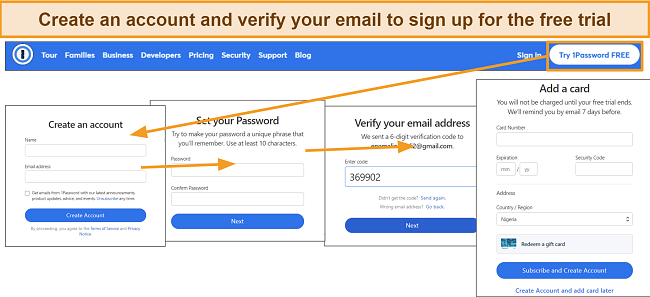
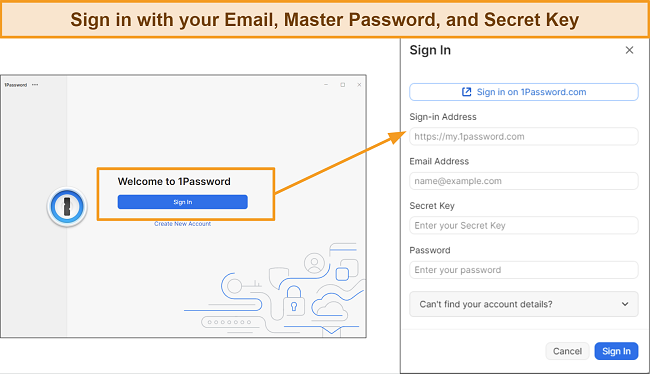
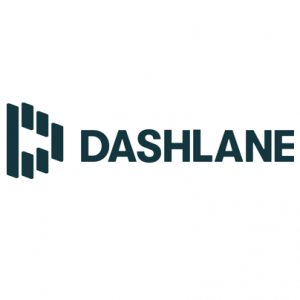
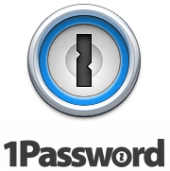


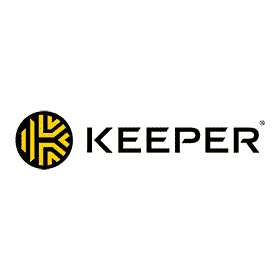

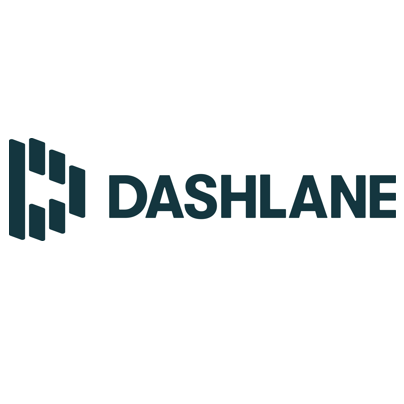
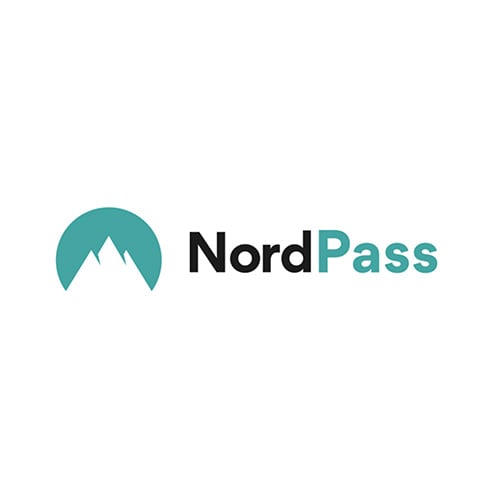


Leave a Comment
Cancel